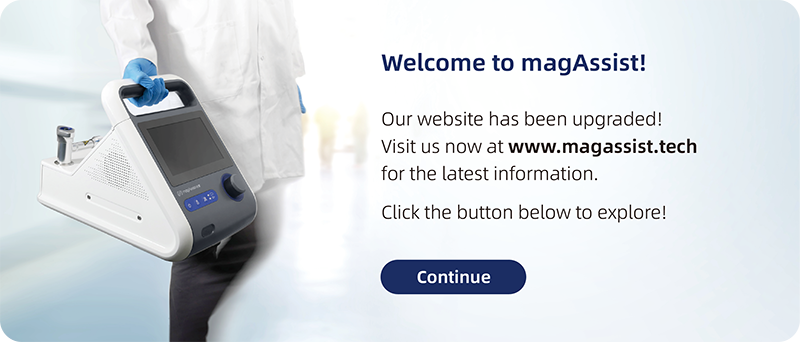BreathMo®: The New Generation ECMO system Revealed at ASAIO Conference
Last month, the American Society for Artificial Internal Organs (ASAIO) 68th Annual Meeting was successfully held in San Francisco. magAssist's product, BreathMo® was highlighted in the meeting.
Dr. Dong Guo from Beijing Anzhen Hospital, introduced the innovation of the device featured in a study titled "A 14-Day In-Vivo Evaluation of a Newly Developed Maglev ECMO System BreathMo®, " demonstrating its effectiveness and safety for providing both pulmonary and cardiac support.
A life-saving tool that experienced fast growth with 40% CAGR in China
Extracorporeal Membrane Oxygenation (ECMO) provides essential support for intensive care unit (ICU) patients, 60% of whom develop heart or respiratory failure with a mortality rate of 23-75%. In China, ECMO has become a crucial mechanical circulatory support (MCS) for critically ill patients with data showing that the number of ECMO cases has increased almost fourfold from 2,826 in 2017 to 10,656 in 2021. (Data from the China ECMO Report 2021 and the survey of the Extracorporeal Life Support Committee of the Chinese Medical Doctor Association)
The growing demand for ECMO is also fueled by the COVID-19 pandemic, during which prolonged ECMO support was commonly used to treat those who suffer from severe symptoms. The limitation of the existing ECMO systems exposed the need for medical device manufacturers to upgrade ECMO devices equipped with advanced functions. These features include a full maglev pump with higher hemocompatibility, an oxygenator with high gas exchange efficiency and low cross-oxygenator pressure drop, aiming to provide long-term life-saving support to patients in need.
The newly developed ECMO, delivering greater performance and safety
During the conference, Dr. Guo pointed out that it is essential to develop ECMOs with full maglev centrifugal pumps, which may better support patients in the long run. The full maglev centrifugal pumps have emerged as a highly promising solution, offering superior hemocompatibility, and presenting potential engineering innovations for long-term ECMO or membrane applications.
Centrifugal blood pumps are frequently utilized in adult ECMO, and most of them rely on pivot bearing, which has a lower hemocompatibility compared with full maglev pumps. Furthermore, the high rotational speed can cause high shear stress, potentially leading to hemolysis.
A journal article in Medicine and Novel Technology and Devices examined the hemolytic performance of pumps in adult ECMO support, which highlighted the enhanced safety and effectiveness of the full maglev flow technology. The detailed computational fluid dynamics (CFD) analysis revealed that the maglev pump outperformed its counterparts by minimizing non-physiological wall shear stress (WSS) and stagnation shear stress (SSS). The maglev pump exhibited the lowest predicted hemolysis index (HI). These computational findings were further supported by experimental results, demonstrating that the maglev pump caused the least damage to blood cells when compared to the Revolution and Rotaflow pumps.
BreathMo®, China's homegrown maglev ECMO system that addresses the unmet medical needs of Chinese patients.
To bridge clinical gaps in China, magAssist has developed a new generation ECMO system, BreathMo®. The use of maglev technology reduces the risk of blood damage caused by mechanical contact bearings, resulting in safer operation. The maglev pump demonstrates superior hemocompatibility with overall low blood damage at the hemolysis level and degradation of high-molecular-weight (VWF).
As mentioned in the conference, the system's flow rate of up to 7L/min is complemented by an oxygenator that maintain exceptional performance, offering a low-pressure drop (less than 50mmHg) even at maximum flow rates. Notably, the device incorporates an ultra-compact portable console weighing less than 8 kg, allowing healthcare professionals to tailor treatment to individual patient needs.
In the study designed to evaluate the in-vivo performance and safety of BreathMo®, the final health status of the ten sheep selected for the trial, with five undergoing VA cannulation and the remaining five undergoing VV cannulation, proved the system's capability to provide pulmonary and cardiac support.
The study revealed their plasma-free hemoglobin levels were within an acceptable range, with consistently optimal oxygenator performance. The PFH values ranged from 0.36 to 14.80mg/dL, far below 40 mg/dL which is an indicator of possible thrombus formation.
The autopsy examinations conducted after the study showed no complications, embolism, thrombus formation, or end-organ damage, with no device-related adverse events reported, further affirming the system's safety profile and paving the way for its first-in-human studies trial in the near future.
"The development of BreathMo® marks another technological milestone as we seek new innovative life-saving solutions to enhance patient well-being while empowering healthcare professionals to improve their treatment outcomes. With our innovative maglev technology that allows for good hemocompatibility, BreathMo® not only provides safe and effective cardiopulmonary support but is also a new promising starting point as we continue to leverage industry and technical resources to unlock new possibilities for the ECMO field," Dr. Chiahao Hsu, Senior Director of Science and Innovation Department of magAssist.





